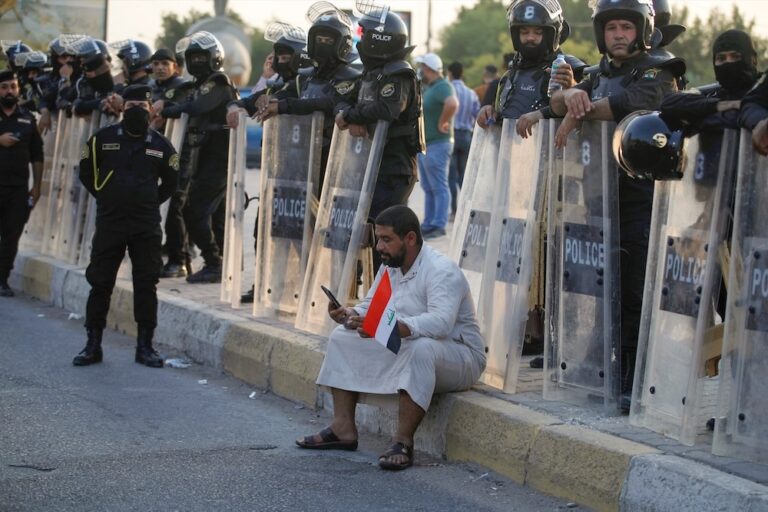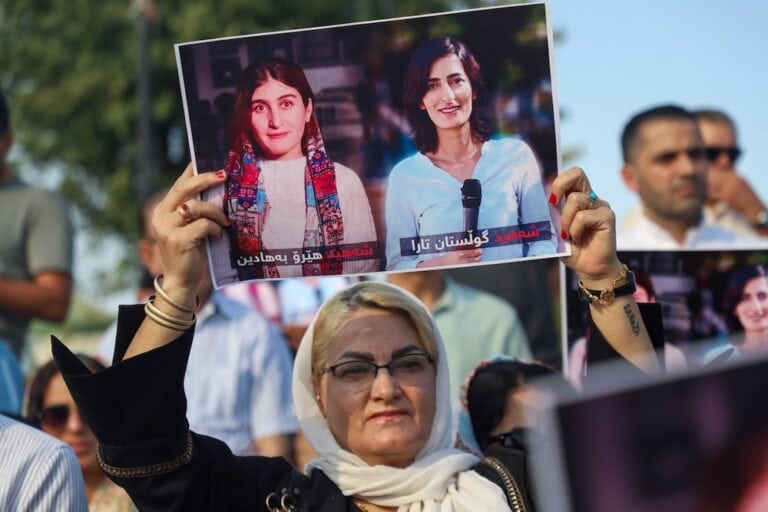(RSF/IFEX) – RSF has called on United States (US) military authorities to explain the continuing detention of Bakhtiar Haddad, an Iraqi interpreter of Kurdish origin who has been held for the past three weeks by US forces after being arrested in Fallujah on 8 November 2004, along with French freelance photographer Corentin Fleury. US officials […]
(RSF/IFEX) – RSF has called on United States (US) military authorities to explain the continuing detention of Bakhtiar Haddad, an Iraqi interpreter of Kurdish origin who has been held for the past three weeks by US forces after being arrested in Fallujah on 8 November 2004, along with French freelance photographer Corentin Fleury. US officials have said Haddad has been held in Abu Ghraib prison since 23 November on suspicion of collaborating with Iraqi guerrillas.
“If the US forces have serious, well-founded reasons for keeping this news media employee in detention, they must produce the evidence,” RSF said in a letter to Lt. John F. Sattler, commander of the US Marines in Fallujah. “Otherwise, they must release him immediately.”
Haddad was working for Fleury at the time of his arrest by US Marines in Fallujah. They had followed the US offensive on the centre of the Sunni rebel city together and, as part of their journalistic work, had met with Islamist guerrillas beginning on 24 October.
When US and Iraqi troops launched their “final” assault on Fallujah on 8 November, Haddad and Fleury tried to leave the city by the north, crossing the railway line to reach the motorway. A report by Fleury in the 27 November issue of the magazine “Le Monde 2” said they were arrested at about 7:00 p.m. (local time) by a group of US Marines. “They detained us for five long days,” he said. “After verifying everything, the Americans let me go, but they kept my interpreter.”
Two photographs taken by Fleury showing Haddad carrying a weapon are said to have prompted US forces’ suspicions about him.
A French-speaker, Haddad has worked with several teams of reporters covering the war in northern Iraq for French news media since early 2003. They include the television stations France 2 and Canal +, and the privately-owned radio station RTL. Staff from these organisations have sent US authorities in Iraq letters stressing Haddad’s professional qualities as an interpreter and media assistant.
After the fall of the Saddam regime, Haddad continued to work for foreign journalists. According to the Bakhtiar Haddad support committee, he is the son of a respected academic from the city of Erbil. “The Kurdish authorities are not aware of his having any Islamist past,” the committee said. “More interested in football than politics, he witnessed the repression in Kurdistan after the first Gulf war, and has never expressed any sympathy for Saddam Hussein’s regime.” An online petition for his release can be signed at http://www.freebakhtiar.org.
The Associated Press news agency has meanwhile reported that gunmen operating a fake checkpoint on a road south of Baghdad kidnapped Iraqi journalist Raad Beraiej Al-Azzawi, of “Sada Wasit” newspaper, on 26 November 2004.
The newspaper’s editor-in-chief, Ayad al-Tamimi, said the kidnapping took place about 40 km outside the city of Qut, which is 160 km southwest of Baghdad. Al-Azzawi reportedly called the newspaper and said no ransom was being demanded and that his abductors had detained him after finding his press card.
Al-Azzawi was a critic of the Saddam Hussein regime and was imprisoned when Saddam was in power.


